PRESERVING A MILITARY LEGACY FOR FUTURE GENERATIONS
The following Reflections represents Sgt Paul Cavnar’s legacy of his military service from 1968 to 1974. If you are a Veteran, consider preserving a record of your own military service, including your memories and photographs, on Togetherweserved.com (TWS), the leading archive of living military history. The following Service Reflections is an easy-to-complete self-interview, located on your TWS Military Service Page, which enables you to remember key people and events from your military service and the impact they made on your life. Start recording your own Military Memories HERE.
Please describe who or what influenced your decision to join the Marine Corps?

There were a few things that I recall. First, I was always impressed with how sharp the Marines at the recruiters’ office looked and I liked the way they presented strength and confidence.
Then, there was my friend Ed Parker who had enlisted some three months earlier. He wrote to me about Boot Camp and how he liked the discipline. He was on his way to Teletype Repair school.
Lastly, many of my high school buddies had received their draft cards by then and all of us were classified 1A. It was not long after those came that some were receiving their draft notices and I wanted to avoid being “drafted”.
Whether you were in the service for several years or as a career, please describe the direction or path you took. What was your reason for leaving?

I wanted to learn more about radio communications and my recruiter said I would have a better chance of getting into that field if I would sign for four years so, that was my choice.
I had learned Morse Code while in high school and that turned out to be a huge plus for me early on.
If you participated in any military operations, including combat, humanitarian and peacekeeping operations, please describe those which made a lasting impact on you and, if life-changing, in what way?

While in Viet Nam, there were three operations that we were part of. However, my job was not outside the base so my work was directly supporting those operations by communication from Chu Lai Air Base.
Of all your duty stations or assignments, which one do you have fondest memories of and why? Which one was your least favorite?

My best duty was in Radiotelegraph School at MCRD San Diego. I finished top in my class but enjoyed learning military communications and operating the radio equipment which I picked up easily. Having been involved with amateur radio in high school, I had a lot of knowledge and information that my classmates did not have and I was able to help those who wanted it with a lot of things.
I also managed to spend some time at the MARS station at MCRD and was allowed to work there while the rest of my class was learning Morse Code. I met some of the best guys I have known there and even today, keep in touch with a few of them on a regular basis. I never worked in the MARS system although that would have been my ideal MOS but did not have the proper amateur radio license to qualify at that time.
My last duty station was an assignment TAD to the rifle range at Camp Lejeune, N.C., where I served as a marksmanship instructor for annual re-qualifying by enlisted and officers. It was a pleasure to coach these Marines and assist them with becoming better marksmen. None of my students was a problem and I don’t recall having any that failed to qualify when the time came. Some of them moved up from Marksman to Sharpshooter or Expert, and that was a great satisfaction. Being able to go to the range on a weekend and work with people shooting their personal weapons was a pleasure and a duty that I would usually volunteer for. I met some excellent shooters, a few of whom had or were participating in the national match teams. I learned a lot from them about long-distance shooting which helped me considerably and greatly improved my own skill level.
From your entire military service, describe any memories you still reflect back on to this day.

I was next in line for a 30-day TAD assignment as the air/ground radio operator on our air group’s C-117 “Hummer”. It was basically a WW-II type airframe very similar to the Army’s C-47 that carried airborne troops over Normandy on D-Day. Our C-117 was a Navy R4D and had more powerful engines and several modifications so it would handle better than the old C-47.
When my time was close, the radioman I was to replace became sick and could not continue one day. I was away from the base escorting some radio equipment to Da Nang for repair and exchange, so the guy behind me, Cpl. Ron Liscum, was chosen to take my place as they had a mission to fly that night and he would need some very quick training. I learned that I had missed out when I returned and was really disappointed since I would have to wait for the next opportunity.
Just two weeks later, the C-117 failed to return from a navigational training mission, and it was discovered crashed at the top of a mountain peak two days later. All four crewmen were killed on impact. Our squadron XO, Lt Col Snead, was the pilot; Capt. Don Berger, my former comm officer, was the co-pilot; Ron Liscum was the radio operator; and Sgt. Bunch the Crew Chief. For anyone interested, there is a crash report on the “Pop-a-Smoke” Combat Helicopter Assn..
What professional achievements are you most proud of from your military career?

My MOS had no civilian equivalencies since being a Radiotelegraph Operator was nearing obsolescence and was being replaced by high-speed RTTY communications. Western Union no longer employed Morse Code operators to send and receive messages, as they too had been using Radio Teletype equipment for many years.
However, my interest in Morse Code came from having learned it during high school. I was always interested in Amateur Radio and I decided to pursue getting my “ham” radio license after my discharge. I studied and passed the exams until I had passed the highest one, the Amateur Extra Class in 1979. My primary interest was volunteering for emergency communications as public service work during disasters and emergencies, so the first 20 years were spent doing much of that work. The hobby has been a great pleasure over the years, and I have made many friends all over the world.
Of all the medals, awards, formal presentations and qualification badges you received, or other memorabilia, which one is the most meaningful to you and why?

I earned no medals for valor or anything of significance other than my Good Conduct Medal. Most likely, my expert marksmanship badges for rifle and pistol are my most prized and I thoroughly enjoy shooting.
Which individual(s) from your time in the military stand out as having the most positive impact on you and why?
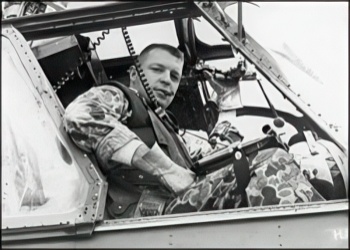
Captain Donald Berger, my former CO, was one of the most inspiring men I have met. Capt. Berger came up through the ranks as a “mustang” officer, receiving his commission after about 12 years of service as I recall. He was an excellent leader and motivator and always treated everyone with great respect and as his equal. I will always remember him and our short time together in Viet Nam.
Another was GySgt Robert Stephens. Gunny Stephens was the company Gunny at C&E Bn. B Co. Radio School at MCRD San Diego. Gunny Stephens gave me the opportunity to jump ahead of my fellow students and take the final exam for Morse Code, and if I passed, he would allow me to work upstairs in the MARS station while the rest of the class learned the code. I passed the test with a 100% score, and he said he had never seen anyone do that. We had several conversations from time to time, and I have great respect for this man who was as much a fine Marine as he was a father figure for me. He looked like my dad, talked like him, and was always available if I had a question.
Gunny Stephens and I met for a second time in 1969, about 7 months after radio school, when he arrived at Chu Lai Air Base to replace the comm section GySgt who was rotating back to CONUS. I was working as the comm section office clerk at the time he arrived and picked him up at the air terminal building in the comm jeep. When he first saw me, his only comment was, “You look familiar. Cavnar? Is that you? Oh my god, I have to herd you around again? Lord help us!”
We got a good laugh and enjoyed a lot of good duty time while I was there.
List the names of old friends you served with, at which locations, and recount what you remember most about them. Indicate those you are already in touch with and those you would like to make contact with.
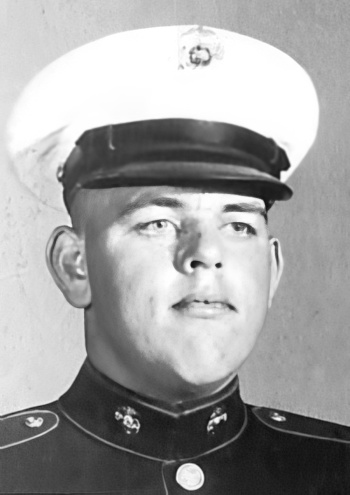
Robert “Bobby” Geurin, who I went through Boot Camp with and Radio School, was from close to my hometown, so we did a lot of stuff together. He went off to Vietnam three months before I did, and we lost touch. While at Camp Lejeune in 1971, I bumped into him during an exercise and we talked for a few minutes. That was the last time I saw him. Bobby has passed on due to injuries from a serious car accident that never healed properly.
Sergeant Barry Weathersby, who took me under his wing while I was in radio school at MCRD San Diego, helped teach me the finer points of working at a MARS station. My short month helping there was a great break from school while the rest of my class was learning Morse Code. I already knew that from high school and took the final exam on the 3rd day of school with a 100% score.
Sgt. Bob Burton was our radio school class director. He was sort of a gruff guy but taught a bunch of us young Marines how to get by while in school and stay out of trouble. We met up again when I went to Vietnam, as he was the senior Sergeant in the MAG-13 Comm Radio platoon. He just laughed when he saw me again.
GySgt. Robert Stephens was the NCOIC of the comm schools at MCRD. I met him when I needed permission to work in the MARS station while the rest of my class learned Morse Code. He said I would have to pass the final exam to do that, which I agreed to, but he also said if I failed, I would be dropped from school and sent to mess duty until another class was formed. I passed with a 100% score, and he said he did not know anyone who did that. After I was with MAG-13 at Chu Lai, our comm chief was rotated home, and I picked up the new Chief at the air terminal. Turned out to be none other than Gunny Stephens. He looked at me and said, “Cavnar? Do I have to put up with you again?” He sort of laughed, and we were ‘friends’ while I was there—or, as good as I could be with an E7 I answered to. I never saw him again, but Sgt. Bob Halliday from MAG-13 comm lived near him and visited with him in about 2004. He retired an MSgt and was working for the Pensacola, FL Sheriff Department. Bob Stephens passed on in 2013.
Can you recount a particular incident from your service which may or may not have been funny at the time, but still makes you laugh?

Most likely, it was during an inspection while at boot camp that was the funniest to me, but it was the ‘end of the world’ at the time. Our series commander, who was a Captain, was conducting the inspection, and as he stood in front of me inspecting my M-14 rifle, he asked what my 2nd General Order. Almost shaking in my boots, I was a nervous wreck, but the General Order came to mind, and I distinctly recall saying, “Sir, the Private’s Second General Order is to walk my post in a merry manner…” At that point, his eyes got great big and pierced straight through mine as he said, “Recruit, start over again and speak a little slower so I can understand what you are saying.” After a few seconds of regaining my composure and receiving my rifle back from the Captain, I recited the Second General Order correctly, to which he replied, “Outstanding!” As he turned to face the recruit next to me, I could see just a twinkle in his eye and a very slight smile on his face.
It wasn’t 30 seconds after we were given at-ease after the inspection that one of my DI’s said loudly, “Walk my post in a merry manner? Gawd, I don’t think this was supposed to be happy hour on the drill field, do you?” Everyone gave a loud “SIR-NO-SIR” and got a little laugh out of it. Our platoon won the inspection streamer for our series in Boot Camp, no thanks to this extremely nervous young recruit.
What profession did you follow after your military service and what are you doing now? If you are currently serving, what is your present occupational specialty?

I decided not to pursue the Marine Corps as a career since I would have to leave my communications MOS, which was already filled, and cross-train to areas I was not interested in having for a career. It was my intention to take classes and obtain my 1st Class FCC Radio license so I could go to work in the commercial radio or broadcasting field. I had used my GI Bill to enroll in a correspondence course that allowed me time to work a full-time job and support my small family as well. But, the course offering turned out to be a scam operation that was not providing all of the course material in a timely manner. They terminated me for a lack of activity, as I found out they had done with hundreds of other veterans, even though I was several lessons ahead of their schedule. It took several years and the help of my congressman to eventually have the debt forgiven. I was never in a place to obtain my license.
Eventually, I went to work for an electrical wholesale business and found that business interesting and enjoyed doing all different facets of it over the years. At one point, I owned my own wholesale company with a partner and have worked for four others, from the largest to one of the smallest. My first supervisor told me that if I liked the business, I should dig in and learn everything I could because he would guarantee me that I would never get rich, but I would always have a job. Dick Plyman, a 5-ft tall Tail Gunner on a B-29 in WW-II, was a bulldog of a boss, but he was also right.
I have only been unemployed twice since working in the electrical wholesale business and those times were to move to a new and better job. I am still in that business and function pretty much as Operations Manager, doing purchasing and data maintenance now.
What military associations are you a member of, if any? What specific benefits do you derive from your memberships?

I am a Life Member of the Vietnam Veterans of America, Veterans of Foreign Wars and the Christian Veterans of America.
In what ways has serving in the military influenced the way you have approached your life and your career? What do you miss most about your time in the service?
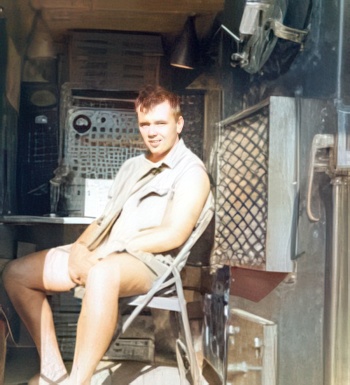
The Marines changed me as a person in my early years in that they took an angry and unhappy young boy and turned him into a self-confident and determined man who learned to never give up and the value of honesty and integrity. The Marines shaped me into a ‘man’ and taught me how to take responsibility for all my actions, including the words I speak. It has also given me the drive to go for the best that I can achieve in all areas of my life.
But all of these are the traits of good men. Great men also know God, and having a strong Christian faith has been the real glue that makes it all work together for me. When my own efforts just are not good enough, the Lord is always there to help in my time of need. Life has been good because I am a Marine. But, life is beautiful because I know Jesus. If you do not do anything else in this life, put your trust in Jesus Christ and know when it is all over, you will live forever in heaven. That is, once you are past the Marines that guard the gates there.
Based on your own experiences, what advice would you give to those who have recently joined the Marine Corps?
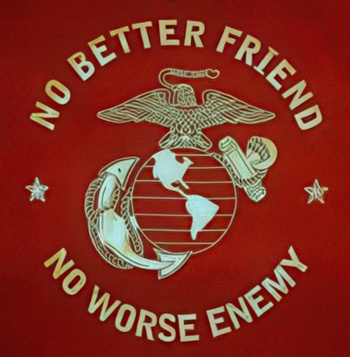
I would strongly recommend that anyone considering joining the Marines do so with their eyes and ears wide open. Learn what it is about and know what you are getting into before you make a commitment. If you are looking for discipline and a sense of duty whether it is to your family or your country, the Marines have all you will need to succeed.
The training will mold you into a new person and one you will respect along with all your friends. You will become “no better friend” and “no worse enemy” when you bear the title of U.S. Marine.
In what ways has togetherweserved.com helped you remember your military service and the friends you served with.
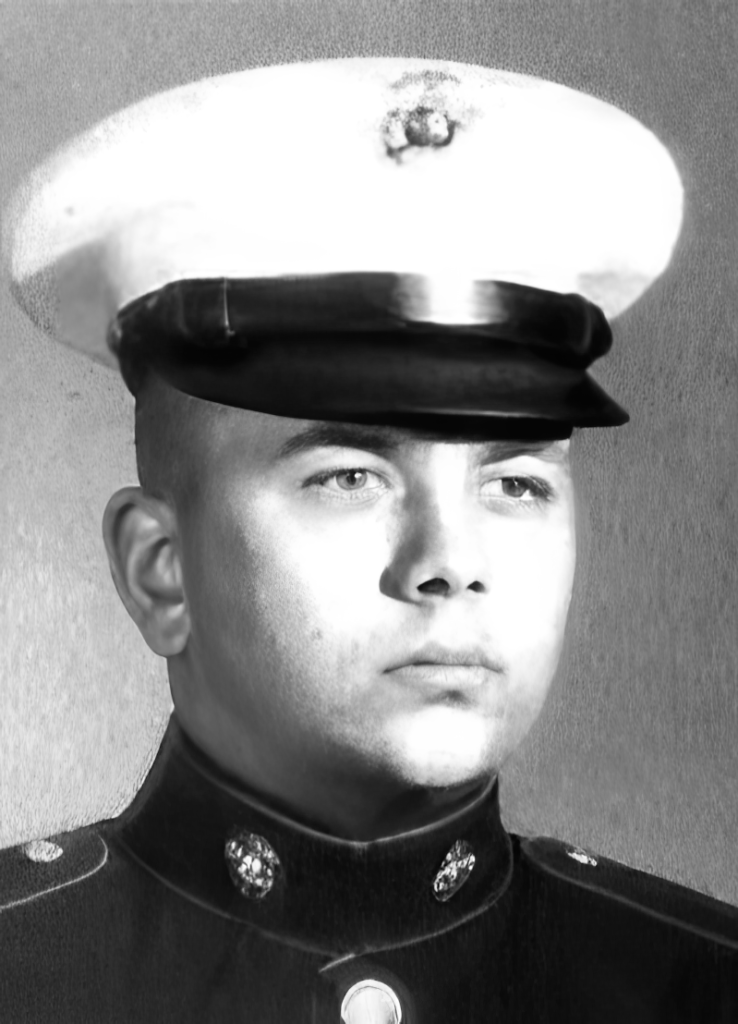
Together We Served (TWS) has been a big benefit for me in locating some of my friends from my days in the Corps. A few more have become friends along the way. It is the best place on the net to accomplish that task. Through TWS and social media, I have found three of my boot camp buddies and have made contact with all of them.
As of 11/10/2019, I located and spoke with my Platoon Commander, then SSgt. Gerald Hollie, for the first time since graduation in June 1968. We spent a long time on the phone, and he has heard from many of the men he helped turn into Marines, and that was the greatest joy in his career. SSgt. Hollie retired as a 1st Sergeant.
KC 9.27.24
PRESERVE YOUR OWN SERVICE MEMORIES!
Boot Camp, Units, Combat Operations
Join Togetherweserved.com to Create a Legacy of Your Service
U.S. Marine Corps, U.S. Navy, U.S. Air Force, U.S. Army, U.S. Coast Guard
0 Comments